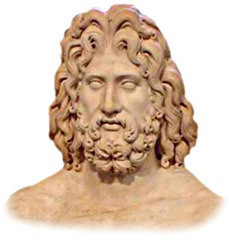Donald J. Robertson's Blog, page 83
December 19, 2012
Roundup of Recent Posts
December 15, 2012
Stoic Quotes from Joseph Addison’s Cato, a Tragedy (1712)
If there’s a Power above us
(And that there is, all Nature cries aloud
Through all her works),
He must delight in virtue;
And that which He delights in must be happy. (Cato)
‘Tis not in mortals to command success,
But we’ll do more, Sempronius – we’ll deserve it. (Portius)
Better to die ten thousand thousand deaths
Than wound my honour. (Juba)
Not all the pomp and majesty of Rome
Can raise her senate more than Cato’s presence.
His virtues render our assembly awful,
They strike with something like religious fear,
And make even Caesar tremble at the head
Of armies flush’d with conquest. (Sempronius)
That Juba may deserve thy pious cares [Marcia], I’ll gaze for ever on thy godlike father [Cato],
Transplanting one by one, into my life,
His bright perfections, till I shine like him. (Juba)
Filed under: Stoicism Tagged: Cato, play, stoic, stoicism








December 13, 2012
The Meditations of Marcus Aurelius
The duration of a man’s life is as a point; the substance of it ever flowing, the sense obscure; and the whole composition of the body tending to decay. His soul is a restless vortex, fortune uncertain, and fame doubtful; in a word, as a rushing stream so are all things belonging to the body; as a dream, or as a smoke, so are all that belong unto the soul. Life is a warfare, and a sojourn in a foreign land. Fame after life is nothing more than oblivion.
What is it then that will guide man? One thing alone: philosophy. And philosophy consists in this, for a man to preserve that inner genius or divine spark which is within him, from violence and injuries, and above all pains or pleasures; never to do anything either without purpose, or falsely, or hypocritically: wholly to depend from himself and his own proper actions: all things that happen unto him to embrace contentedly, as coming from Him from whom he himself also came; and above all things, with all meekness and a calm cheerfulness, to expect death, as being nothing else but the dissolution of those elements, of which every living being is composed.
And if the elements themselves suffer nothing by this their perpetual conversion of one into another, that dissolution, and alteration, which is so common unto all, why should it be feared by any? Is not this according to nature? But nothing that is according to nature can be evil.
Marcus Aurelius, The Meditations, Book II, Section 15
Filed under: Stoicism Tagged: philosophy, stoic, stoicism








December 11, 2012
Stoicism Workshop at Exeter University
I’m posting this again, mainly to test out the special video post feature on WordPress, which I’ve never used before! It’s a very well-made video describing the workshop on Stoic philosophy and psychotherapy that took place at Exeter University earlier this year. I was there along with some of my friends and other academics and psychologists and therapists. The whole thing was organised by Prof. Christopher Gill. It led to the Stoic Week project, which was a huge success in terms of publicity for Stoicism, featuring in The Independent and Guardian (twice) newspapers!
Filed under: Stoicism Tagged: philosophy, stoic, stoicism








Whoever it was …
Whoever it was who said, “Fortune, I have made a pre-emptive strike against you, and I have deprived you of every single loophole,” was not basing his confidence on bolts, locks and fortifications, but on principles and arguments which are available to anyone who wants them. […] For if the mind is self-indulgent, and takes the easiest courses all the time, and retreats from unwelcome matters to what maximizes its pleasure, the consequence is weakness and feebleness born of lack of exertion; but a mind which trains and strains itself to use rationality to conceive an image of illness and pain and exile will find that there is plenty of unreality, superficiality and unsoundness in the apparent problems and horrors each of them has to offer, as detailed rational argument demonstrates. (Plutarch, On Contentment, 467C)
Plutarch was a Platonist but perhaps influenced to some extent by aspects of Stoicism.
Filed under: Stoicism Tagged: philosophy, Plutarch, stoic, stoicism








Stoicism Subreddit
This is one of the best online forums for discussion of Stoicism.
Filed under: Stoicism Tagged: philosophy, stoic, stoicism








December 10, 2012
Top Ten Most Popular Articles on Stoicism
 Based on the last twelve months’ of traffic, these are the most popular posts on Stoic philosophy from this blog:
Based on the last twelve months’ of traffic, these are the most popular posts on Stoic philosophy from this blog:
Marcus Aurelius on Anger & Empathy
Excerpt: Shame-Attacking Exercises
A Crash Course in Stoicism
The View from Above (Stoic Meditation Script)
Stoicism: God or Atoms?
The System of Stoic Philosophy
Were Hand Gestures a Technique of Stoicism?
Animal Metaphors in Stoicism (Part 1): The Bull and the Lion
Cato’s Speech on Stoic Philosophy from Lucan’s The Civil War
Some Ancient Stoic Poems
Filed under: Stoicism Tagged: philosophy, stoic, stoicism








From the Ancient Greeks to Rational-Emotive-Behavior-Therapy Today
I stumbled across this article by Sandra Lipsitz Bem that talks about Stoicism and REBT:
I think of patients much the same way as I think about myself. I am human. I make mistakes. People who come to therapy are just people who are trying to figure it all out and maybe they did not have parents or teachers who helped them to understand themselves. Sometimes we simply need someone to talk with, to reflect our minds and by so doing help us to know ourselves a little better. If another person takes the time to reflect back to people, like a mirror, what another perceives (not what the therapist thinks or judges to be right or wrong) then people can learn, adapt, and have a different outcome. This is more effective than simply following an ideology, although that has its place. We need, like narcissus, to see our own reflection in a still pond. A good therapist is like that still pond, calm.
Read the rest of the article here
Filed under: Stoicism Tagged: philosophy, REBT, stoic, stoicism








December 6, 2012
The Stoic Teachings of Zeus
 Copyright © Donald Robertson, 2012. All rights reserved.
Copyright © Donald Robertson, 2012. All rights reserved.
[This is a work in progress. If I remember rightly, Seneca also attributes Stoic guidance or advice to Zeus but I haven’t got round to incorporating that yet.]
It is wise, not listening to me but to the Logos, to agree that all things are one.
The one and only wise thing wishes and does not wish to be called by the name of Zeus. – Heraclitus, On Nature
Heraclitus seems to imply that it is as though the voice of Nature, or Zeus, were calling us saying “all things are one”, and that wisdom consists in echoing this, in our own thoughts and words. Is he attributing these words to the Divine Logos, to the voice of Zeus? The Stoics, who followed Heraclitus in many regards, also appear to attribute certain doctrines or phrases to Zeus, to God, or to Nature – all broadly equivalent terms in their pantheistic worldview. For example, Epictetus makes many references to laws or directions provided by Zeus:
For the Zeus at Olympia does not show a proud look, does he? No, but his gaze is steady, as befits one who is about to say: “No word of mine can be revoked or proved untrue.” (Discourses, 2.9.26)
However, the following passage is perhaps the most striking example of a Stoic-sounding maxim being put into the mouth of Zeus:
This is the law which God has ordained, and He says, “If you wish any good thing, get it from yourself.” (Discourses, 1.29.4)
It appears to express perhaps the most fundamental doctrine of Stoicism: that “the only good is moral good”, or that the essence of the good is virtue. Zeus says: “If you wish any good thing, get it from yourself.” That obviously resonates with what Shaftesbury called the “Sovereign” precept of Epictetus’ Stoicism: “Some things are under our control and some things are not.” From this a twofold doctrine emerges: (1) the good resides squarely within our sphere of volition, in moral excellence or virtue (2) external events, beyond our control, are indifferent with regard to our happiness and wellbeing (eudaimonia). As we shall see, this twofold doctrine is repeatedly attributed to Zeus himself by Epictetus, alongside the claim that it is something that anyone may discern through considering the basic “common sense” facts of human nature.
For example, Epictetus elsewhere uses the rhetorical strategy known as apostrophe (“turning away”) when he breaks off from his dialogue with students into an imaginary conversation with Zeus himself in order to put the following words in the god’s mouth:
But what says Zeus? “Epictetus, if it were possible, I would have made both your little body and your little property free and not exposed to hindrance. But now be not ignorant of this: this body is not yours, but it is clay finely tempered. And since I was not able to do for you what I have mentioned, I have given you a small portion of us, this faculty of pursuing an object and avoiding it, and the faculty of desire and aversion, and, in a word, the faculty of using the appearances of things; and if you will take care of this faculty and consider it your only possession, you will never be hindered, never meet with impediments; you will not lament, you will not blame, you will not flatter any person.” (Discourses, 1.1)
The “law” of Zeus is elsewhere defined as (1) to guard what is our own, our reason and faculty of choice, and make good use of it; and (2) to not claim as ours what is external, or yearn for what fate has denied us, but to be willing to give up what fate has temporarily “loaned” us, as Epictetus likes to put it.
And what is the law of God? To guard what is his own, not to lay claim to what is not his own, but to make use of what is given him, and not to yearn for what has not been given; when something is taken away, to give it up readily and without delay, being grateful for the time in which he had the use of it – all this if you do not wish to be crying for your nurse and your mammy! (Discourses, 2.16.27-28)
Elsewhere, Epictetus talks about how, when death or misfortune strike, he wishes to be found obeying the commandments of Zeus. This are likewise described as (1) to use the powers, perceptions, and preconceptions, granted to him, wisely and (2) to be contented with whatever fate Zeus sends him:
For I wish to be surprised by disease or death when I am looking after nothing else than my own will, that I may be free from perturbation, that I may be free from hindrance, free from compulsion, and in a state of liberty. I wish to be found practising these things that I may be able to say to God, Have I in any respect transgressed thy commands? have I in any respect wrongly used the powers which thou gavest me? have I misused my perceptions or my preconceptions have I ever blamed thee? have I ever found fault with thy administration? I have been sick, because it was thy will, and so have others, but I was content to be sick. I have been poor because it was thy will, but I was content also. I have not filled a magisterial office, because it was not thy pleasure that I should: I have never desired it Hast thou ever seen me for this reason discontented? have I not always approached thee with a cheerful countenance, ready to do thy commands and to obey thy signals? Is it now thy will that I should depart from the assemblage of men? I depart. I give thee all thanks that thou hast allowed me to join in this thy assemblage of men and to see thy works, and to comprehend this thy administration. (Discourses, 3.5)
Again, Epictetus insists that Zeus himself has given them guidance. Perhaps recalling Heraclitus (“Listening not to me but to the Logos…”) he therefore insists the students present should listen to the guidance of Zeus and not to their mortal teacher. Again, the word of Zeus, embodied in human nature, clearly encapsulates the basic Stoic doctrine (“Follow Nature”), which divides into the twofold injunction: (1) Protect that which is your own, your reason, volition, and virtue; (2) do not grasp after that which is external, and belongs to another, or to God.
Has not Zeus given you directions? Has he not given you that which is your own, unhindered and unrestrained, while that which is not your own is subject to hindrance and restraint. What directions, then, did you bring with you when you came from him into this world, what kind of an order? Guard by every means that which is your own, but do not grasp at that which is another’s. Your trustworthiness is your own, your self-respect is your own; who then, can take these things from you? Who but yourself will prevent you from using them? But you, how do you act? When you seek earnestly that which is not your own, you lose that which is your own. Since you have such promptings and directions from Zeus, what kind do you still want from me? Am I greater than he, or more trustworthy? But if you keep these commands of his, do you need any others besides? But has he not given you these directions? (Discourses, 1.25.3-6)
Moreover, there are a couple of other cryptic passages in which Epictetus appears to attribute certain doctrines or sayings to Zeus. First, “let the better always prevail over the worse”, which seems to be taken by the Stoics to mean that the Divine Spark in man, his volition (prohairesis), is inherently able to overcome external impressions, through the faculty of judgement.
[…] nothing else can overcome volition, but it overcomes itself. For this reason too the law of God is most good and most just: “Let the better always prevail over the worse.” […] For this is a law of nature and of God: “Let the better always prevail over the worse.” Prevail in what? In that in which it is better. (Discourses, 1.29.13)
The second passage suggests that a Divine Law says that he who falsely claims to be a Stoic, or who, in general, claims things outside of his control as his own, is doomed to suffer and injure himself as a result:
For what does this [divine] law say? Let him who pretends to things which do not belong to him be a boaster, a vain-glorious man: let him who disobeys the divine administration be base, and a slave; let him suffer grief, let him be envious, let him pity; and in a word let him be unhappy and lament. (Discourses, 3.24)
Finally, the famous Hymn to Zeus of Cleanthes. Epictetus quotes this repeatedly, although never more than the first four lines below, and sometimes the first line only. This doesn’t tell us any more about the laws or commandments attributed by Stoics to Zeus but it’s the perfect expression of their commitment to “Follow Nature” or “Follow God”, namely Zeus, in all they do:
Lead me on, O Zeus, and thou Destiny,
To that goal long ago to me assigned.
I’ll follow readily but if my will prove weak;
Wretched as I am, I must follow still.
Fate guides the willing, but drags the unwilling.
– Cleanthes, Hymn to Zeus
Filed under: Stoicism Tagged: philosophy, stoic, stoicism, Zeus








December 3, 2012
Stoic Week: Final Poll (“What Next?”)
Final Poll
 Well done students of Stoicism! Today’s statistics:
Well done students of Stoicism! Today’s statistics:
We had over 8,000 hits on the Stoicism Today website during Stoic Week!
About 150 people reported they were participating in the study.
We have also acquired 150 new Twitter (@Stoicweek) followers during the week.
Over 1,100 people have now viewed the original Youtube Video of the workshop at Exeter University organised by Prof. Gill.
Over 120 people commented on The Guardian article by Patrick about Stoic Week.
Over 370 people have voted so far in the poll “Who is your favourite Stoic?“.
What next, though? You can vote in the poll below (up to three choices) for any ancient philosophy you fancy doing as an alternative to #Stoicweek in the future. Underneath is a roundup of recent posts in case you missed anything…
Take Our Poll
Filed under: Stoicism Tagged: philosophy, poll, stoic, stoicism



















